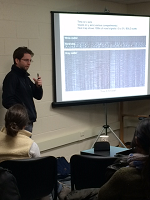Dr. JD Power gives talk at MNC
Published: Friday, February 20, 2015

Dr. Jonathan D. Power gave a talk titled "Spontaneous fMRI signal: What’s in it for me?" at the Maryland Neuroimaging Center to a standing room only crowd.
A substantial fraction of fMRI studies are now entirely or partially “functional connectivity” studies, which use spontaneous, “task-free” fMRI signals as the substrates of analysis. Many cognitive neuroscientists will grant that there is something to be found in these signals. But the origin and meaning of these signals is unclear. Further, there are difficulties finding the “signal” amidst the noise. Power's talk touched on some methodological issues that are central to functional connectivity MRI studies and discussed the "meaning" of spontaneous fMRI signals.
Dr. Power did his doctoral research at Washington University in Saint Louis under the mentorship of Steve Petersen. He is currently a post-doctoral fellow at the NIMH working with Alex Martin. His work has focused on using spontaneous fMRI signals to understand brain organization. One focus has been deriving representations of whole-brain networks from spontaneous fMRI signals, identifying important nodes, and examining the effects of brain lesions at those nodes on cognition. Another focus, spurred by work on pediatric subjects, has been the description of motion artifact in resting state fMRI and the development of methods to identify and counteract this artifact. Dr. Power is recognized as an authority on resting-state fMRI and his work has appeared in a number of high profile outlets, including Science, Nature Neuroscience, Neuron, and PNAS.
